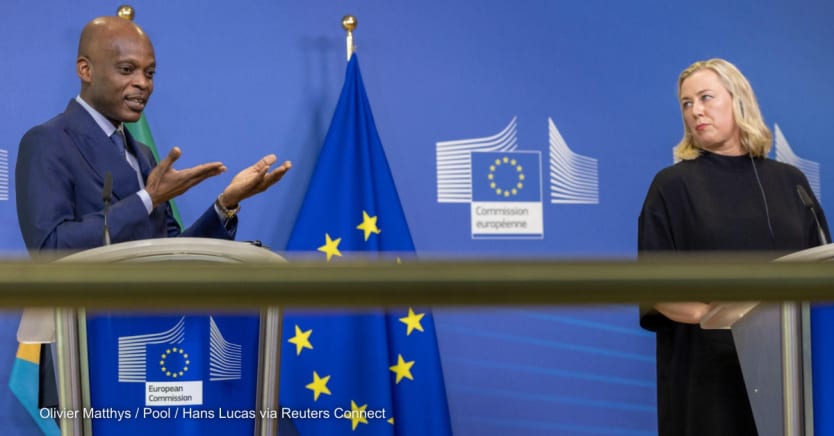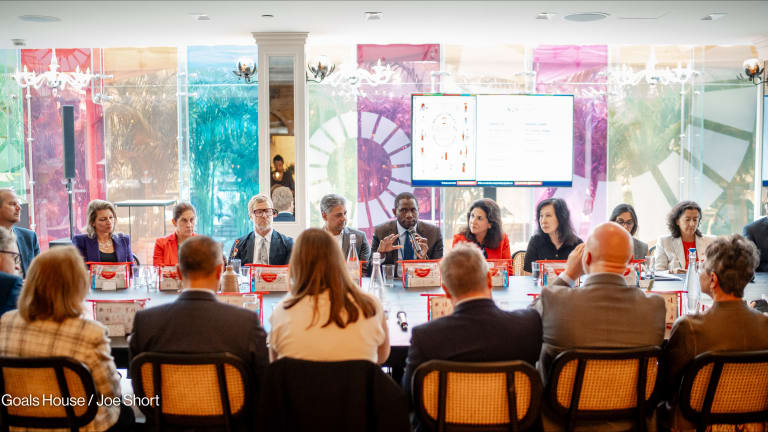
The COVID-19 pandemic has highlighted the factors needed to ensure healthy lives and promote well-being for all. We have seen communities lose access to clean water, sanitation, or health services. Many children and young people have gone without access to quality education. There are adults with few opportunities to switch jobs or maintain livelihoods.
The crisis has underscored the extent of environmental degradation, poor housing, and lack of access to electricity. It has exacerbated gender inequality, hunger, and poverty.
COVID-19 response
Recognizing these inequalities, the European Union, its member states, the European Investment Bank, and other European financial institutions, acting together as “Team Europe,” took decisive action. We mobilized more than €40 billion ($46.9 billion) to mitigate the health and socio-economic impact in our partner countries.
For example, we helped set up a dedicated COVID-19 treatment hospital and testing centers in Mauritius, and acquired and distributed protective equipment to 500 health structures in Mauritania.
Ensuring healthy lives and promoting well-being for all, at all ages, is a 360-degree affair, and success depends on us all.
—Along with the World Health Organization and other partners, we helped create the Access to COVID-19 Tools Accelerator, or ACT Accelerator, the global initiative to help all countries get access to tests, treatments, and vaccines. Team Europe supports its best-known pillar, COVAX, with €3 billion for vaccine equity. The ACT Accelerator also has a cross-cutting connection across different workstreams to ensure that all actions taken now ultimately contribute to the long-term resilience of health systems.
Strengthening health systems
The EU has long supported universal health coverage — accessible, affordable, quality health for all — through bilateral and global initiatives to strengthen health systems.
The pandemic has made the gaps and inequalities in health systems more apparent. It has underlined the need for enhancing health system preparedness, as well as the capacity to prevent, detect, and respond to disease outbreaks. It has also highlighted the importance of well-maintained health infrastructure, trained health workers, and affordable access to vaccines, medicines, diagnostics, and health technologies.
This is now our main focus as we learn from these lessons. Through our new Global Europe instrument — in addition to the Rome Declaration adopted by global leaders at the Global Health Summit — we will increase our bilateral and regional support for health. We will do it with a focus on strengthening health systems, reinforcing preparedness and response capacities, and increasing the self-reliance and resilience of our most vulnerable partners.
Game-changing initiative
In May, Team Europe set out plans for a comprehensive initiative on the development of local manufacturing capacity for vaccines, medicines, and health technologies in Africa.
This project will help tackle COVID-19, future pandemics, and endemic diseases such as malaria and tuberculosis. It foresees the rapid creation of local manufacturing hubs in Africa but, crucially, does not stop there.
We aim to help develop the entire ecosystem around manufacturing, including regulatory frameworks, education and training, and research and development, as well as sustainable public and private finance mechanisms.
A first look at the 'Team Europe initiatives'
Devex dives into the European Commission's plans for "transformational impact" in dozens of countries and regions over the next seven years.
Progress has been rapid. In Rwanda, we are already supporting a stronger regulatory framework and investment in the health sector through the local Food and Drug Authority. In Dakar, Team Europe has announced the beginnings of large-scale support for vaccine production by the Institut Pasteur. The construction of a new manufacturing plant is expected to start later this year, with the objective of producing 25 million doses of vaccines monthly by the end of 2022.
Future outlook
Comprehensively tackling the inequalities in access to water, food, and the internet; quality education; decent jobs; and proper housing, is an even longer-term process. As commissioner for international partnerships, I have made it the overarching objective of our cooperation to address the economic, environmental, and social inequalities — including gender inequalities — which stand in the way of thriving lives.
Our approach is holistic and cross-cutting. In addition to investments in human development and the environment on national, regional, and global levels — following a “One Health” approach — we also support cooperation and partnerships for a fair economy. This should enable countries to invest more and better in health systems, education, and social protection.
As an accelerator of progress on all Sustainable Development Goals, education has a key role to play. Girls’ education is especially known to improve overall lifetime health outcomes for women and their families.
Ensuring healthy lives and promoting well-being for all, at all ages, is a 360-degree affair, and success depends on us all, and on our effective cooperation across sectors. Working together, as Team Europe, we increase our impact on the path to sustainable recovery and to building inclusive, resilient health systems that leave no one behind.
Visit the Building Back Health series for more coverage on how we can build back health systems that are more effective, equitable, and preventive. You can join the conversation using the hashtag #BuildingBackBetter.









